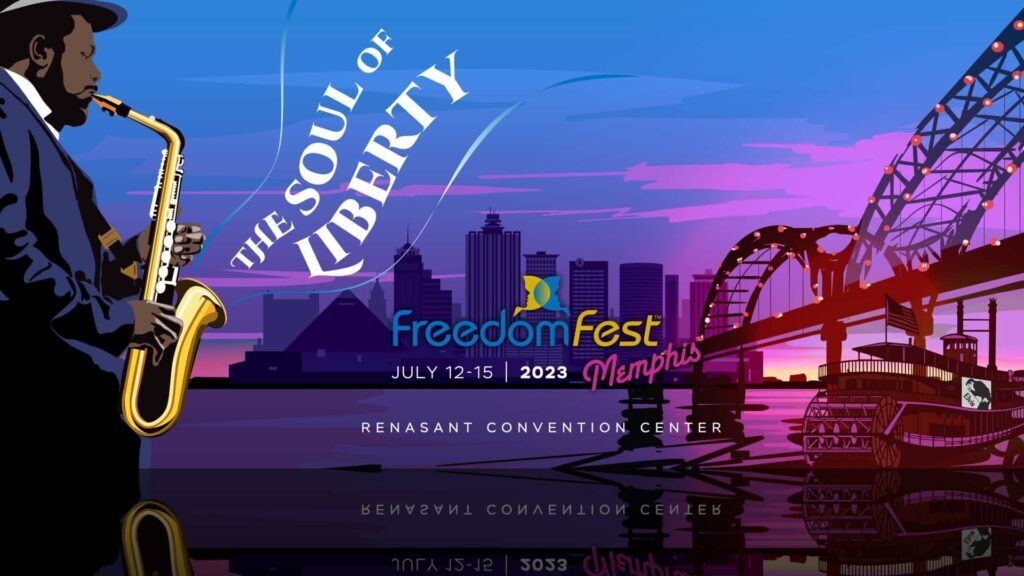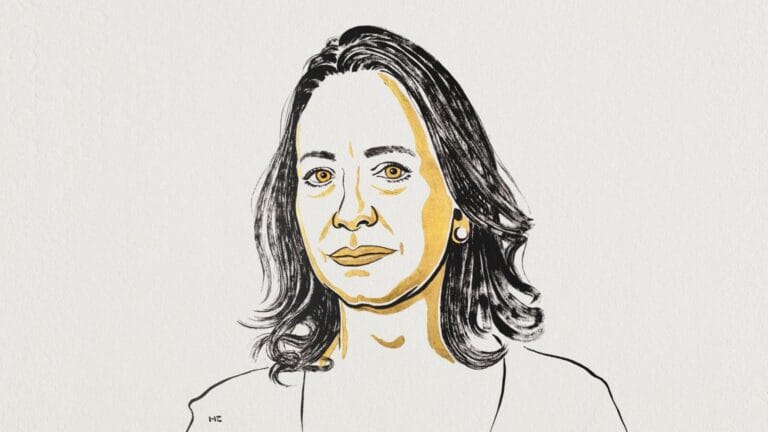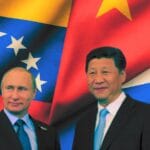En Memphis Tennessee (EE. UU.), 2000 libertarios se reunieron del 12 al 15 de julio de 2023 para el FreedomFest, celebración que fue lanzada por el economista Mark Skousen en 2007. “La idea detrás del FreedomFest –explica Skousen– es que siento que hemos estado perdiendo la batalla por la libertad desde hace un tiempo. Entonces, se me ocurrió la idea de crear una reunión nacional (e internacional si aplica) para los amantes de la libertad, donde una vez al año nos congreguemos para aprender unos de otros, relacionarnos y socializar, y celebrar la libertad… o lo que queda de ella”.
Rápidamente, estableció el evento como “la reunión de mentes libres más grande del mundo: una organización independiente sin afiliaciones a partidos políticos”. Al atractivo de la celebración se suma a que se lleva a cabo simultáneamente con otros eventos: la Cumbre Financiera Global (una conferencia sobre inversiones) y el Festival de Cine Himno (el festival de cine libertario más grande del mundo), y cada año hay un orador famoso. En el pasado, han participado William Shatner (el Capitán James Tiberius Kirk en Star Trek) y la leyenda del boxeo George Foreman. Este año fue Mike Rowe, de la serie de televisión emitida por Discovery Channel Dirty Jobs.
“Memphis tiene una tasa de criminalidad muy alta, con estadísticas oficiales que registran 1.750 delitos por cada 100.000 habitantes. Solo tres ciudades estadounidenses tienen tasas de criminalidad más altas”, este fue el “estado de cosas” con el que el entrenador de fútbol americano Bill Courtney acusó durante su intervención al sistema judicial estadounidense. “Aunque los Estados Unidos envía a más personas a prisión que cualquier otro país, el crimen crece constantemente. El problema –según Courtney– es la tasa de reincidencia del 70 %”. Mostró que las iniciativas privadas destinadas a conseguir empleos para exprisioneros han reducido la “tasa de reincidencia” hasta en un 8 %, a veces comenzando con cosas sencillas, como una propuesta para que personas sin hogar tomen clases de jogging: “Al principio participaban unos pocos, después fueron cientos. Solo aprender la disciplina de levantarse a las 6:00 todas las mañanas marcó la diferencia”. Su mensaje final fue: “No esperen nada del Gobierno. No resolverá los problemas. Empecemos nosotros mismos”, y se enorgullece del hecho de que sus proyectos se llevan a cabo sin ningún apoyo de este: “No se involucró ni un dólar proveniente del Gobierno”.
El “Wokeism” fue tema de numerosos discursos, incluido uno de Vivek Ramaswamy. El hombre de 37 años es el candidato más joven para las primarias presidenciales del Partido Republicano de 2024. El diario The New York Times lo llama el “candidato anti-woke”. “El problema –afirmó– es que cada vez hay más y más estadounidenses que se definen a sí mismos como víctimas”. También se opone a las Directrices ESG, que cree están conduciendo a la politización de la economía y que, en última instancia, equivalen a la abolición de la economía de libre mercado, porque sugieren que los empresarios y los consumidores ya no decidirán qué producir y dónde invertir. “¡El capitalismo es el mejor sistema! –exclamó– Una convicción que, a pesar de sus diferencias, une a todos los libertarios en el FreedomFest”.
Steve Forbes, cuando subió al escenario, criticó a los Estados Unidos y Europa por irse cada vez más hacia un “socialismo moderno”. Sobre esto profundizó: “En el pasado, los socialistas nacionalizaron la propiedad privada. Hoy, se persigue el mismo objetivo a través de una regulación estatal cada vez mayor. Esto –explicó– socava la propiedad privada hasta dejar solo una cáscara vacía. Cada vez más, son los políticos y los funcionarios (y no las empresas y los consumidores) quienes deciden qué se produce. Los Bancos Centrales –continuó– están actuando cada vez más como las autoridades de planificación en los países socialistas”. Como lo ve Forbes, las políticas de los Bancos Centrales están destruyendo cada vez más las monedas.
La transformación de la economía actual se lleva a cabo principalmente bajo la bandera de la “lucha contra el cambio climático”, fue el tema de la charla de Michael Shellenberger. No niega el “cambio climático”, pero cree que sus efectos han sido exagerados por falsas estadísticas y fatídicos escenarios sin fundamento. Asimismo, señala las contradicciones de las políticas de muchos Gobiernos: “En Alemania, por ejemplo, el Gobierno ha decidido eliminar gradualmente las plantas de energía nuclear, dejando al país dependiente de otros países para las importaciones de electricidad generada a partir de la quema de carbón”.
El tema de una de las sesiones fue si se deben o no aumentar los impuestos a los ricos en los Estados Unidos. El economista Lanny Ebenstein propuso que los impuestos a los ricos deberían aumentarse al 50 %. Su argumento: “Incluso cuando la tasa impositiva era del 70 % o más, la economía estadounidense experimentó un crecimiento muy fuerte, mientras que en tiempos de impuestos bajos, tendió a estancarse”. Por otra parte, Arthur Laffer, quien se hizo famoso por haber sido asesor de Ronald Reagan y a cuyo nombre se debe el de la Curva de Laffer, postuló que los impuestos más bajos conducen a mayores ingresos fiscales y más crecimiento, discrepándole vehementemente. El economista afirmó: “El error de Ebenstein es que confunde las tasas impositivas marginales con los impuestos realmente pagados. En los períodos de tasas impositivas muy altas que cita, había tantos esquemas de ahorro de impuestos que casi nadie pagaba las altas tasas impositivas que está usando como argumento. Ejemplo: La tasa impositiva marginal máxima en 1962 fue del 91 %. Después de las deducciones y los créditos, solo 447 de los 71 millones de contribuyentes, realmente pagaron impuestos a la tasa máxima”.
También hubo oradores de otros países, como Gloria Álvarez, de 38 años, quien hace poco participó –no oficialmente– en las Elecciones Presidenciales de Guatemala, pero perdió ante dos candidatos de izquierda. La izquierda gobierna ahora en la mayoría de los países latinoamericanos –ganando recientemente en Brasil, Colombia, Perú, e incluso Chile–. Según Álvarez, la verdadera razón del éxito de los candidatos socialistas en América Latina es el fracaso de los Gobiernos de derecha, que a menudo han sido profundamente corruptos y solamente se han preocupado por defender sus privilegios. “Privatización –explicó– por lo general ha significado «vender» antiguas empresas estatales a bajos precios a sus amigos. Los recaudos de impuestos –se queja– están siendo malgastados, financiando en gran medida burocracias y sindicatos inflados. Solo el 2 % del gasto público –señala Álvarez– se invierte en la importante área de seguridad interna. El Estado de derecho debe fortalecerse masivamente y esta proporción debe aumentar al 50 %”. Al mismo tiempo, aboga por la legalización de la marihuana y la prostitución, porque “solo el crimen organizado se beneficia de las prohibiciones, y la Policía y los Tribunales no pueden concentrarse en las tareas que son verdaderamente relevantes”. Al defender el derecho al aborto y la legalización de las drogas, libertarios como Álvarez se distinguen de la derecha tradicional, aunque en el campo de la política económica aboga por un impuesto único (flat tax), una reducción considerable del papel del Estado en los mercados ¡y más capitalismo! Su tesis: “El Estado es demasiado fuerte donde debería ser débil –especialmente en la economía– y demasiado débil donde debería ser fuerte, es decir, en seguridad interna. Menos injerencia del Estado en la economía y más dinero para la Policía y la justicia, son la solución”.
Hubo una acalorada discusión sobre el nuevo nacionalismo en los Estados Unidos y si es un peligro o no. Bryan Caplan, un libertario que aboga por “fronteras abiertas”, cree que el nacionalismo es una gran amenaza. “En todo el mundo, el nacionalismo es un peligro, ya sea en Rusia, China o los Estados Unidos”, afirmó. Rich Lowry, en oposición a la posición de Caplan, argumentó que en un momento en que la izquierda está tratando de dividir a la sociedad a través de las políticas identitarias “woke”, existe una lealtad que mantiene unido al país ¡y que ese es el compromiso con la nación!
Uno de los aspectos más destacados del evento fue el lanzamiento de una nueva serie de videos: “Steve Forbes on Achievement” por Steve Forbes e izzit.org (https://www.izzit.org/forbes/). “Heroes of Capitalism” (“Héroes del capitalismo”) podría ser un título mejor, puesto que Forbes presenta a diez (10) empresarios y destaca lo que podemos aprender sobre la economía de mercado a partir de sus vidas.
Ya para finalizar, el Festival de Cine Himno ofreció 32 películas, 15 paneles y cuatro discursos independientes sobre temas que incluyen la libertad de expresión, el espíritu empresarial, la lucha contra la opresión, los aislamientos por el COVID-19, Bitcoin, el legado de Calvin Coolidge y la importancia de la paternidad. “The Exiles”, película producida por Steven Soderbergh, ganó el premio a Mejor Largometraje Documental, mientras que el premio a Mejor Cortometraje Documental fue para “To My Father”, una conmovedora historia sobre Troy Kotsur de la que se comienza a hablar como potencial candidata para los Óscar. “The Unredacted”, una película que fue cancelada por varios festivales de cine importantes después de que estallaron las protestas en el Festival de Cine de Sundance, ganó el Gran Premio Himno.

In Memphis, Tennessee (USA), 2,000 libertarians gathered from July 12-15, 2023, for FreedomFest, which was launched by economist Mark Skousen in 2007. “The idea behind FreedomFest –explains Skousen– is that I have felt that we have been losing the battle for freedom for some time. So, I came up with the idea of creating a national gathering (and international if its applicable) of freedom lovers where once a year we meet to learn from each other, network and socialize, and celebrate liberty… or what’s left of it”.
He quickly established the event as “the world’s largest gathering of free minds: an independent organization with no political party affiliations”. Adding to the event’s appeal is that it is held in conjunction with other events: the Global Financial Summit (an investment conference) and the Anthem Film Festival (the largest libertarian film festival in the world), and each year there is a celebrity speaker. In the past, William Shatner (Captain James Tiberius Kirk in Star Trek) and boxing legend George Foreman have appeared. This year it was Mike Rowe from the Discovery Channel TV series Dirty Jobs.
“Memphis has a very high crime rate, with official statistics registering 1,750 crimes per 100,000 residents. Only three American cities have higher crime rates”, this was the “state of affairs” that American football coach Bill Courtney touched on in his indictment of the American justice system. “Although the U.S. sends more people to prison than any other country, crime is constantly on the rise. The problem –he said– is the 70 percent recidivism rate”. He showcased private initiatives aimed at getting ex-prisoners into jobs, which have reduced “the recidivism rate” as low as eight percent, sometimes it starts with simple things, such as an initiative to get homeless people to take jogging classes: “At the beginning, only a few took part, later there were hundreds. Just learning the discipline of getting up at 6:00 every morning made a difference”. His final message: “Don’t wait for the Government. It will not solve the problems. Let’s start ourselves”, and he is proud of the fact that his projects get by without any Government support: “Not one Government dollar was involved”.
“Wokeism” was the subject of numerous speeches, including one from Vivek Ramaswamy. The 37-year-old is the youngest candidate for the 2024 Republican Party presidential primaries. The daily The New York Times called him an “anti-woke candidate”. “The problem –he said– is that more and more Americans define themselves as victims”. He also opposes ESG Guidelines, which he believes are leading to the politicization of the economy and ultimately amount to the abolishment of the free market economy, because entrepreneurs and consumers will no longer decide what to produce and where to invest. “Capitalism is the best system! –he exclaimed– A conviction that, for all their differences, united all libertarians at FreedomFest”.
Steve Forbes, when took to the stage, criticized the U.S. and Europe for increasingly turning to “modern socialism”. By this he means: “In the past, socialists nationalized private property. Today, the same goal is being pursued through ever more State regulation. This –he explained– undermines private property until only an empty shell remains. Increasingly, it is politicians and civil servants (and not companies and consumers) who decide what is produced. Central Banks –he continued– are acting more and more like planning authorities in socialist countries”. As Forbes sees it, Central Banks policies are increasingly destroying currencies.
The transformation of the economy today is primarily taking place under the banner of “the fight against climate change”, which was the topic of Michael Shellenberger’s speech. He does not deny “climate change” but believes that its effects have been exaggerated by falsified statistics and unsubstantiated worst-case scenarios. He also points out the contradictions of many Governments’ policies: “In Germany, for example, the Government has decided to phase out nuclear power plants, leaving the country dependent on other countries for imports of electricity generated from burning coal”.
The topic of one session was whether to raise taxes on the rich in the USA. Economist Lanny Ebenstein argued that taxes on the rich should be increased to 50 percent. His argument: “Even when the tax rate was 70 percent or higher, the U.S. economy experienced very strong growth, while in times of low taxes, it has tended to stagnate”. On the other hand, Arthur Laffer, who became famous as an advisor to Ronald Reagan and whose name became associated with the Laffer Curve, which States that lower taxes lead to higher tax revenues and more growth, vehemently disagreed. The economist asserted: “Ebenstein’s mistake is that he confuses marginal tax rates with taxes actually paid. In the periods of very high tax rates he cites, there were so many taxes saving schemes that hardly anyone paid the high tax rates he is using as an argument. Example: The top marginal rate of tax in 1962 was 91 percent. After deductions and credits, only 447 out of 71 million taxpayers actually paid any taxes at the top rate”.
There were also speakers from other countries, such as 38-year-old Gloria Álvarez, who recently ran in Guatemala’s Presidential Election –not officially– but lost to two left-wing candidates. The left now rules in most Latin American countries –recently winning in Brazil, Colombia, Peru and even Chile–. According to Álvarez, the real reason for the socialist candidates’ success across Latin America is the failure of right-wing Governments, which have often been thoroughly corrupt and only concerned with defending privileges. “Privatization –she explained– has usually meant ‘selling’ former State-owned enterprises cheaply to friends. Tax receipts –she complains– are misused, largely funding inflated bureaucracies and trade unions. Only two percent of Government spending –Álvarez points out– is invested in the important area of internal security. The rule of law must be massively strengthened, and this share increased to 50 percent”. At the same time, she advocates the legalization of marijuana and prostitution, because “it is only organized crime that benefits from bans, and the Police and Courts cannot focus on truly relevant tasks”. By advocating the right to abortion and the legalization of drugs, libertarians such as Alvarez distinguish themselves from the traditional right, but in the field of economic policy, she advocates a flat tax, a considerable reduction in the role of the State in markets, and more capitalism! Her thesis: “The State is too strong where it should be weak –especially in the economy– and too weak where it should be strong i.e., in internal security. Less State interference in the economy and more money for police and justice, are the solution”.
There was a heated discussion about the new nationalism in the USA and whether it is a danger or not. Bryan Caplan, a libertarian who advocates “open borders”, believes nationalism is a major threat. “All around the world, nationalism is a danger, whether in Russia, China, or the USA”, he claimed. Rich Lowry, in opposition to Caplan’s position, argued that at a time when the left is trying to divide society through “woke” identity politics, there is a loyalty that holds the country together, and that is the commitment to the nation!
One of the event’s major highlights was the launch of a new video series: “Steve Forbes on Achievement” by Steve Forbes and izzit.org (https://www.izzit.org/forbes/). “Heroes of Capitalism” might be a better title, as Forbes profiles ten entrepreneurs and highlights what we can learn about the market economy from their lives.
Now to finish, the Anthem Film Festival offered 32 films, 15 panels, and four standalone speeches on topics including free speech, entrepreneurship, the fight against oppression, COVID-19 lockdowns, Bitcoin, Calvin Coolidge’s legacy, and the importance of fatherhood. “The Exiles”, a film produced by Steven Soderbergh, won the award for Best Documentary Feature, while the award for Best Short Documentary went to “To My Father”, a moving story about Troy Kotsur that is being talked about as a potential Oscar contender. “The Unredacted”, a film that was canceled by several major film festivals after protests erupted at Sundance Film Festival, won the Anthem Grand Prize.









